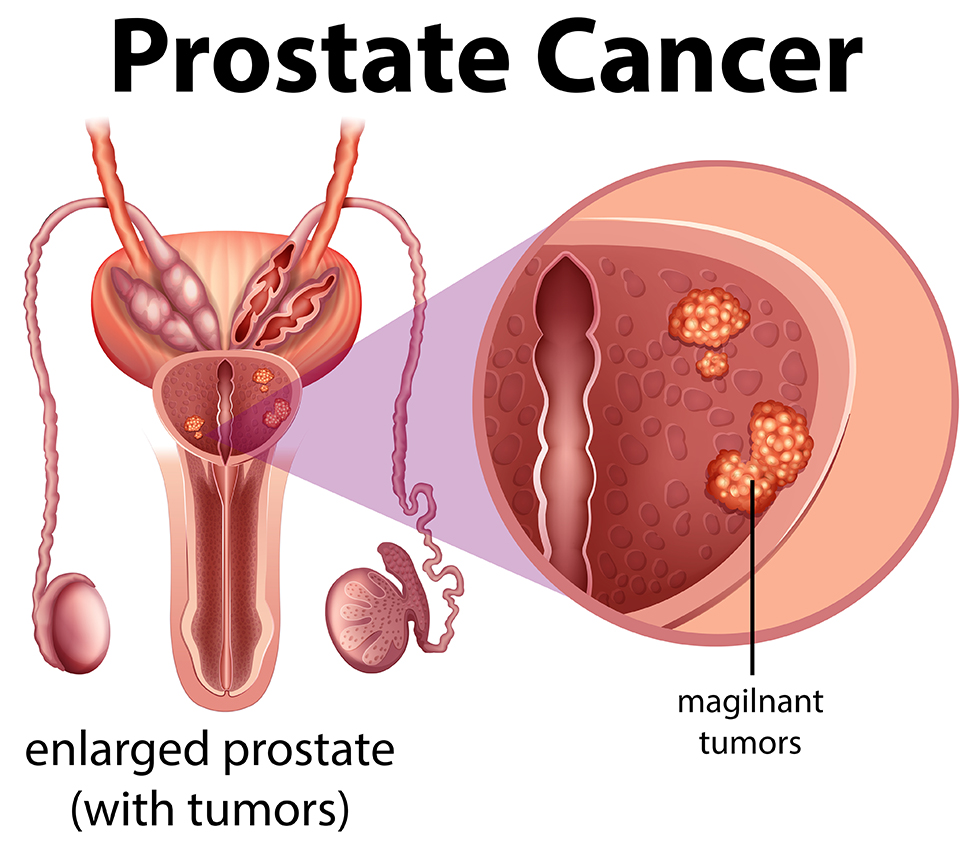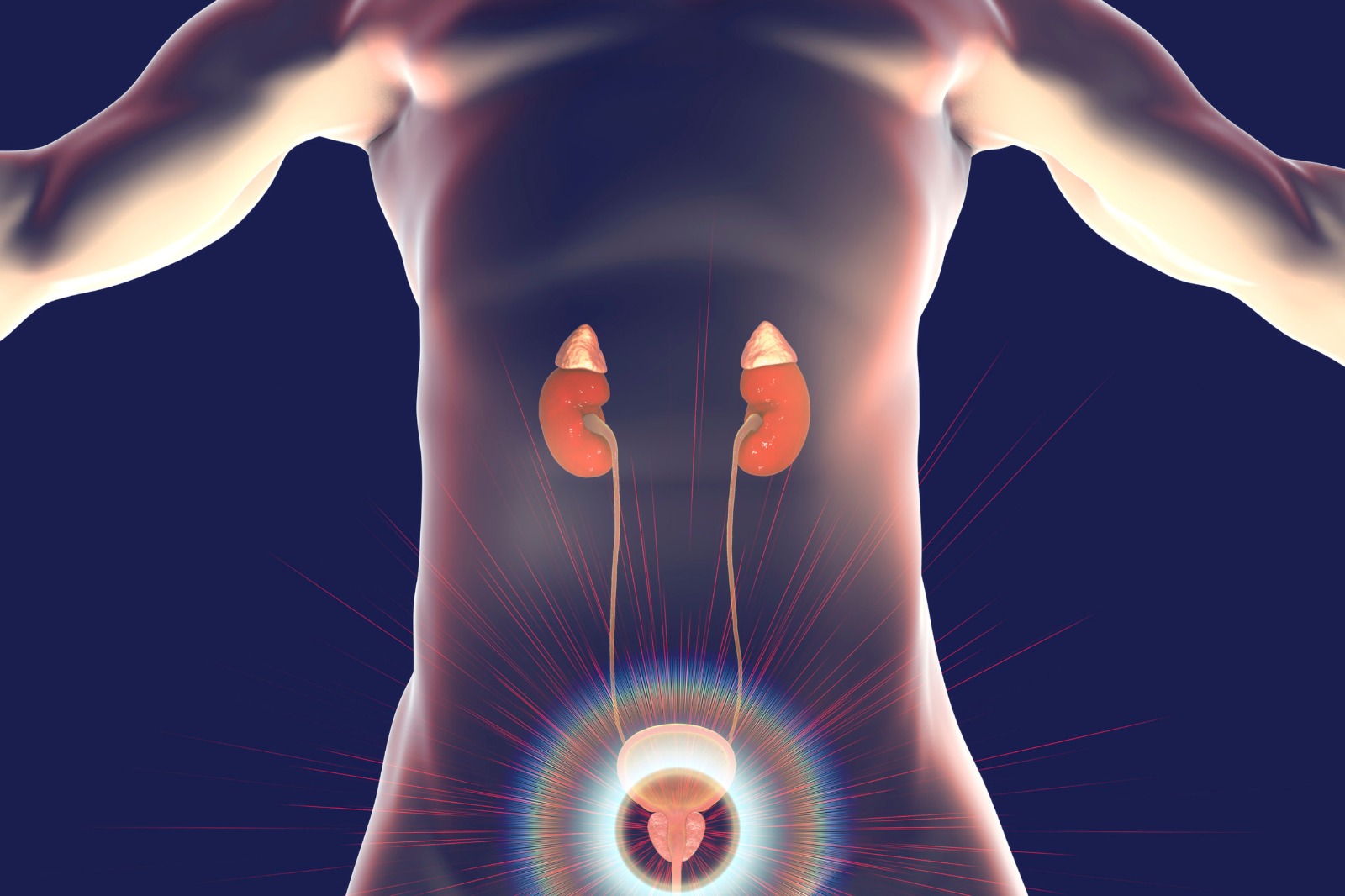Overview of Prostate Cancer
We can describe Prostate cancer as a type of cancer that develops in males when they are suffering from a prostate condition. It majorly occurs in the prostate gland which is walnut shaped that produces seminal fluid and carries the sperm count. Categorized among the most prevalent cancer kinds, the majority of these cancers develop slowly and are limited to the prostate gland. Many individuals opt for active surveillance, however, for aggressive cases, common treatments include radiation therapy and surgery.
Possibly, Prostate Cancer is treatable if diagnosed in the early stages! It is also the time when patients have the best options of treatment, which include active Surveillance or focal therapy that has no negative side effects

10 Signs Indicating Prostate Cancer
Prostate cancer develops in the walnut-shaped prostate gland, situated below the bladder and in front of the rectum in men. This gland produces fluid that mixes with semen, sustaining sperm health. Mentioned below are possibly ten symptoms that indicate occurrence of prostate cancer:
➤ More frequent need to urinate
➤ Urination difficulties
➤ Weak or slow stream; dribbling
➤ Blood in urine
➤ Change in erectile function
➤ Less ejaculate
➤ Blood in semen
➤ Painful urination
➤ Painful orgasm/ejaculation
➤ Lower back and hips pain

Various Types Of Prostate Cancer
Mentioned below are some of the types of this type of cancer that most men can suffer:
1. Adenocarcinoma
The most common form arising within the prostate gland cells and the tubes surrounding it.
Two Types of Adenocarcinoma Prostate Include:
Acinar Prostate: The majority of people suffer from this type as it occurs in the gland cells that line the prostate gland.
Ductal Adenocarcinoma: This prostate type begins from the cells which form the tubes (ducts) of the prostate gland and is likely to spread faster than acinar adenocarcinoma.
2.Transitional Cell Carcinoma
This cancer begins in the prostate cells located in the tube that transports urine out inside the human body.
3.Prostate Squamous Cell Carcinoma
Derived as flat cells surrounding the prostate glands and usually tend to increase in size and spread faster than the prostate cancer adenocarcinoma.
Small Cell Prostate Cancer
Also classified as a form of neuroendocrine tumor, as it can grow more rapidly than other types of prostate cancer.
Some Rare Prostate Cancer Types Include:
➤ Sarcoma
➤ Lymphoma
Its Usual Nature
Prostate cancer ranks second among cancers affecting men, following skin cancer. According to the CDC, 13 out of 100 individuals who suffer from prostate cancer may develop prostate cancer at some point. Most of them will go on to live normal lives until they pass away due to causes not related with prostate cancer, however, some will not require treatment.
Non-cancerous Prostate Conditions
It’s worthy to mention here that not all growths that you may come across in your prostate are cancerous in nature. Benign prostatic hyperplasia and Prostatitis are two conditions that can appear like symptoms of prostate cancer, however, it doesn’t actually raise risk of developing prostate cancer.
Causes
However, the actual cause of prostate cancer is not clear, but when we compare it to other cancer types, it occurs when cells in the prostate divide excessively. Unlike normal cells eventually ending up dying, prostate cancer usually progresses slowly, and early detection is key for successful treatment.
As the cells grow, the tumor could break and spread to other areas within the organs. Luckily, prostate cancer generally develops slowly and most tumors are detected before cancer has spread beyond the prostate.

Risk Factors
Mentioned below are some factors that tend to develop risks for prostate cancers in men:
Age – As you get older, the risk for getting prostate cancer in men gets higher and most commonly after the age of 50
Family Medical History – If a blood relative confirmed having prostate cancer sometime before, then this could elevate your chances for having the same. Your family gene heritage can likely increase the risk of getting prostate cancer.
Race – For reasons not yet identified, Black people have a higher risk of getting advanced or aggressive prostate cancer than people from other races.
Obesity – People who are overweight could be at risk for a higher chance of developing prostate cancer than those who are thought to have an average weight, although studies have found mixed outcomes.
Diagnostic Methods
It is essential to mention here that not everyone with prostate cancer requires to undergo a cancer screening process. This is the matter if the doctor thinks that your cancer is developing slowly, they could put off further testing as it’s not severe enough to involve treatment. Some common diagnostic procedures involved in the process of detecting prostate cancer includes:
Imaging: In certain conditions, the doctors recommend for an MRI or transrectal ultrasound that most likely suspect the areas that could be cancerous by capturing some images.
Biopsy: Needle biopsy recommended by your doctor may involve picking a tissue sample for lab examination to determine cancer.
PSMA PET: Scans utilize prostate-specific membrane antigen targeting to detect and localize prostate cancer cells with high sensitivity and specificity.

Treatment And Management Approaches
Mentioned below are some of the treatment and management options for prostate cancer that the doctors usually utilize during treatment.
➤ Surveillance Method
➤ Surgical Processes
➤ Radiation Therapy
➤ Systemic Therapies
➤ Focal Therapy
- Possible Treatment Negative Effects
These may include:
➤ Incontinence
➤ Erectile Dysfunction
➤ Infertility
Reducing Prostate Cancer Risks
Mentioned below are some methods you can apply to lower the chance of getting prostate cancer:
➤ Discuss with your doctor and join regular prostate screenings.
➤ Essentially, try maintaining a healthy weight which can reduce chances for other ailments as well. You can discuss with your doctor what a healthy weight is for you.
➤ Moderate exercising regularly for about twenty minutes at least is a must every day to help yourself stay away from developing cancerous stages.
➤ Adopting nutritious eating habits is another catch to boost your overall health. However, there is no single diet that you can follow to fight cancer, but discussing your diet plan with your doctor can benefit you a lot.
➤ Put a full stop on adopting negative lifestyle choices and stop consuming tobacco products. If you are a smoker, then you must see your doctor to help you implement a program for quitting smoking to stop such habits.
